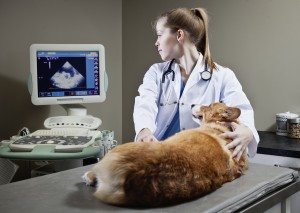Full disclosure – by Dr. Enid Stiles
Things in veterinary medicine are changing and at an incredibly fast pace. The days of veterinarians like James Herriot are in many ways behind us. Don’t get me wrong. Being a vet is still everything I hoped and dreamed it would be. But gone are the days for most of us where we can or should do it all! Repairing a fracture on a dog’s broken leg and then rushing to the farm to perform a c-section on a cow…. few veterinarians nowadays, with the exception of those in more rural practices, will experience this kind of practice. For those of us in the city, we stick with a few species that tend to sleep on our couches and share our food. And we have become really good at treating and working with those furry family members.
How often do clients come in to see me and look like a deer in headlights when I tell them “We can refer you to a specialist for that”? A specialist – who knew! In fact, many of my clients have no idea that there are veterinary specialists out there; cardiologists, surgeons, neurologists, internal medicine specialists, dermatologists, ophthalmologists, etc.
I am a staunch believer in FULL DISCLOSURE. Not only is it the ethical thing to do, but we are bound as veterinarians to disclose information to our clients. A good example was a recent issue that occurred in BC where a client left her dog for overnight care at the vet clinic and as per the client, she was not informed that the dog would be left alone overnight. Complications occurred and well, it hit the news, as these topics always do.

Recently, I saw a cat in consultation who suddenly had a heart murmur that was never heard before and he needed to have a simple procedure under anesthesia (a skin mass removal). I was concerned that his cardiac function may not be good enough to undergo an anesthesia. So I had the discussion with the owner and she decided to go see the cardiologist before placing him under anesthesia. The cardiologist came to our hospital and performed an ECG and cardiac ultrasound. He gave me details on the disease process affecting this cat as well as treatment options and a safe protocol for anesthesia. Luckily, we were only at the early stages of this heart condition and with certain medications and dietary recommendations, this cat now has a much better chance of living many more years as well as a reduced risk under anesthesia. Everyone wins!
Another common example of when a specialist can come in handy is dentistry. We often see dogs fracturing their big canine tooth (the dagger one). Did you know that your dog could be a candidate for a root canal?? This is an important tooth to keep if you can. Most general practitioners such as myself are only capable of doing extractions and not more advanced procedures like root canals.
There is a little overlap though between what some general practitioners do and specialists do. This is where it is important to have the information at hand, so you can decide what is the best option for you and your pet. For example, many veterinarians do abdominal ultrasounds and some have become very good at them. However, these ultrasounds are simply preliminary screening diagnostics. They will give your veterinarian some extremely important information such as identifying free fluid in the abdomen, large masses on the spleen, stones in the bladder, etc. But the small details may be missed. There is always an option that the ultrasound could be performed or may need to be performed by a specialist radiologist. These appointments are easy to make and not as expensive as you may think.
Some general practitioners perform certain orthopedic procedures such as cruciate ligament repairs and fracture repairs. They may have obtained special training and experience in these more complicated surgeries but they are not certified surgeons. Surgery is ALL specialist surgeons do, every day, all day. They went to school an extra 4 years minimum in residency programs, did research and wrote board exams for their specialty. Yes, it may be more expensive at times and because of this, surgeons may not be an option for you, which we all respect. It is worth weighing the pros and cons and thinking long term. Simply having a consultation with a specialist surgeon before making your final decision may be worthwhile.
Many of my clients will opt to have us perform certain procedures or hospitalize their pet because they feel comfortable with us. They trust us. They think their dog or cat is happier with us (because they know the place). But there is always full-disclosure on what we are, who we are and what we can do. Information is golden. It’s up to you to make the decision that is right for you. Ask the questions, we have nothing to hide and only want what is ultimately best for your pet.

 Montreal Dog Blog Montreal's Online Dog Park
Montreal Dog Blog Montreal's Online Dog Park




